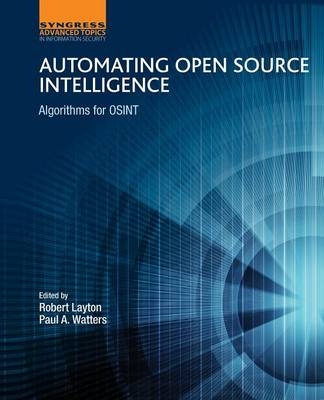
Automating Open Source Intelligence
Syngress Media,U.S. (Verlag)
978-0-12-802916-9 (ISBN)
The book is beneficial to both practitioners and academic researchers, with discussions of the latest advances in applications, a coherent set of methods and processes for automating OSINT, and interdisciplinary perspectives on the key problems identified within each discipline.
Drawing upon years of practical experience and using numerous examples, editors Robert Layton, Paul Watters, and a distinguished list of contributors discuss Evidence Accumulation Strategies for OSINT, Named Entity Resolution in Social Media, Analyzing Social Media Campaigns for Group Size Estimation, Surveys and qualitative techniques in OSINT, and Geospatial reasoning of open data.
Dr. Robert Layton is a Research Fellow at the Internet Commerce Security Laboratory (ICSL) at Federation University Australia. Dr Layton’s research focuses on attribution technologies on the internet, including automating open source intelligence (OSINT) and attack attribution. Dr Layton’s research has led to improvements in authorship analysis methods for unstructured text, providing indirect methods of linking profiles on social media. Paul A. Watters is a Professor of Information Technology at Massey University. He was previously Associate Professor of Information Security at the University of Ballarat, and co-founded the Cybercrime Research Laboratory at Macquarie University. His research interests are human factors in security and open source intelligence, and in measuring the risks associated with cybercrime, especially to children and young people. He is a Fellow of the British Computer Society and his work has been cited 1,249 times He has worked closely with government and industry on many projects, including Westpac, IBM, and the Australian Federal Police (AFP).
Ch 1. Introduction to OSINT
Ch 2. Advances in Automated OSINT
Ch 3. Named Entity Resolution in Social Media
Ch 4. Relative Cyberattack Attribution
Ch 5. Evidence Accumulation Strategies for OSINT
Ch 6. Analyzing Social Media Campaigns for Group Size Estimation
Ch 7. Crawling the Dark Web
Ch 8. Case Study: The Digital Underground
Ch 9. Graph Creation and Analysis for Linking Actors
Ch 10. Case Study Predicting Crime with OSINT
Ch 11. Ethical Considerations w/Public Data
Ch 12: Limitations of automating OSINT
Ch 13. Geospatial Reasoning of Open Data
Ch 14: Future Trends
| Erscheint lt. Verlag | 10.12.2015 |
|---|---|
| Verlagsort | Rockland, MA |
| Sprache | englisch |
| Maße | 191 x 235 mm |
| Gewicht | 450 g |
| Themenwelt | Informatik ► Theorie / Studium ► Algorithmen |
| ISBN-10 | 0-12-802916-1 / 0128029161 |
| ISBN-13 | 978-0-12-802916-9 / 9780128029169 |
| Zustand | Neuware |
| Informationen gemäß Produktsicherheitsverordnung (GPSR) | |
| Haben Sie eine Frage zum Produkt? |
aus dem Bereich


